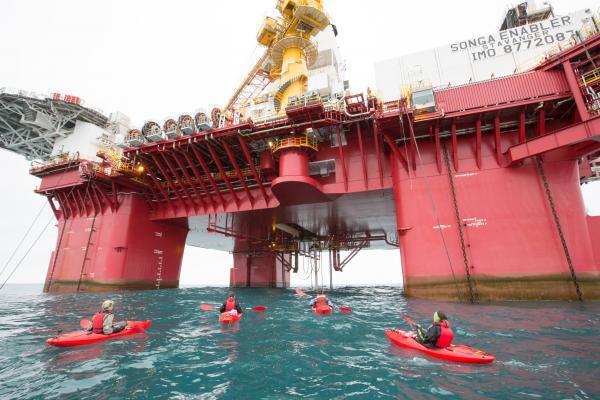Arctic drilling lawsuit puts Norway's green credentials to the test
Climate campaigners in Norway are taking the government back to court over its approval of oil exploration in a part of the northern Arctic believed to contain untapped oil riches, but which environmentalists say is a fragile ecosystem that serves as the Arctic’s “biological motor”.
Issued on:

In a case that has dragged on since Oslo ratified the Paris Agreement in 2016, local NGOs Greenpeace Nordic and Nature and Youth this week asked the Supreme Court to weigh in on a decision to grant 13 oil and gas exploration licences.
Despite being twice defeated in lower courts, the lawsuit has made Norway accountable for emissions created by the oil it exports to other countries, and has established the state is constitutionally obliged to ensure a safe and clean environment.
Campaigners say Norway has a responsibility not to produce more fossil fuels than the global climate can handle, arguing the world has already discovered more coal and gas than it can burn if we are to avoid catastrophic climate change.
While a favourable Supreme Court decision could significantly impact the petroleum industry’s hopes of expansion, the goal has never been to stop all new oil licences, says Therese Hugstmyr Woie, head of Nature and Youth.
NGOs hope to take Norway to Supreme Court over Arctic oil
Arne Storrønningen (@arnestor) February 24, 2020
"Opening up the pristine areas in the Arctic for oil drilling in the time of climate emergency is not acceptable" @FrodePleym @GreenpeaceNorge@NaturogUngdom@GretaThunberg @350Europe @Regjeringenhttps://t.co/qvMoLCm9mF
“These most vulnerable areas – in the far north of the Barents Sea – are where we must keep the oil in the soil,” she said. “We already have oil drilling all over our coast … so let's not make more of our country dependent on the oil industry.”
Oslo estimates the Barents Sea is home to billions of barrels of untapped oil – or about two-thirds of the oil and gas reserves that have yet to be discovered off its coast.
As a major oil and gas exporter, Norway is one of the world’s richest countries – with a walloping sovereign wealth fund that makes each of its citizens a “crown millionaire”.
Fossil fuel giant also a pioneer of green energy
When it struck pay dirt in the North Sea in 1969, Norway was catapulted to the top of the economic pile – the riches of the Norwegian Continental Shelf funding world-class health and education systems, as well as a healthy state pension.
Since its Eureka moment, this Scandinavian powerhouse has been steadfastly supplying the world with oil, and feeding gas to Europe via a network of pipelines spanning thousands of kilometres.

Remarkably, at the same time Norway has carved out a place for itself as a pioneer of green energy, building an array of geothermal, hydropower and wind stations that scatter the landscape and draw attention for their striking design that complement nature.
Ninety-eight percent of Norway’s electricity production is generated by renewable energy sources – most of which is hydropower, which turns flowing water into electricity.
Thanks to its fjords, rivers and coastline spanning the North Sea, Norwegian Sea and the Barents Sea, Norway was clearly made for hydropower, which has been part of its history since the late 19th century.
Along with Finland and Japan, Norway is leading the world in clean energy innovation relative to the size of its economy – spending big on public clean energy research and development.
It’s all the more impressive for a country that is among the world’s top exporters of crude oil.
Interview: Therese Hugstmyr Woie, head of Nature and Youth
This apparent contradiction is something David Boyd, the UN Special Rapporteur on human rights and the environment, has termed the “Norwegian paradox": the fact Norway’s leadership in addressing the climate crisis is largely thanks to its oil wealth.
Boyd has said Norway needs to work harder to wean itself off its dependency on oil, while critics warn this dual role is unsustainable, saying Norway cannot have it both ways.
For now, environmental groups must wait until the spring to learn if the Supreme Court will pick up their case. It comes amid fears a ruling against oil would condemn Norway's generous social welfare system.
Hugstmyr Woie is adamant Norway’s future oil and gas fields should be off-limits, and that opening them up during a global climate emergency is unacceptable.
“The government is saying that we have the cleanest oil and that our gas exports to Europe are combatting coal … but we think that’s a big lie.”
Daily newsletterReceive essential international news every morning
Subscribe